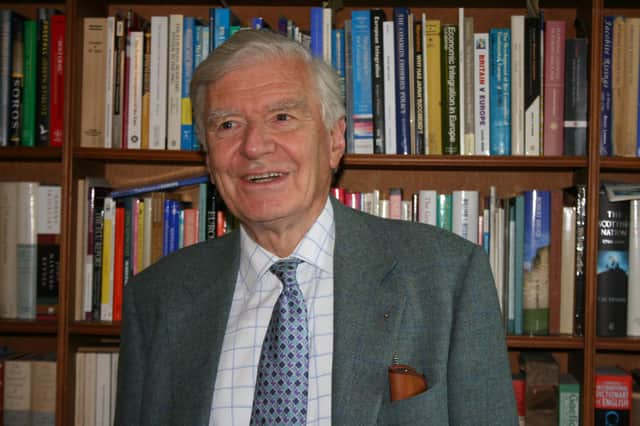Book review: After Brexit - The Economics of Scottish Independence, by Gavin McCrone


In the debate over the economics of Scottish independence, no name resonates more loudly than that of Gavin McCrone, economist, academic, and veteran public servant. Born in Ayr in 1933, McCrone is now approaching 90; and back in 1974, when he was Chief Economic Adviser to the Secretary of State for Scotland, he wrote a confidential briefing paper for Scottish Ministers about the vast sums likely to accrue to the British treasury from the UK’s North Sea oil and gas wealth, once it was fully developed.
As a good and thorough civil servant, McCrone did not hesitate to point out, in that report, how much weight that vast prospect of wealth might add to the case for Scottish independence, were it to be fully known. And when that confidential paper finally emerged into public view in 2005, there was much anger in the pro-independence camp about the extent to which the Scotland of the 1970s had been kept in the dark about its own potential, missing the chance – so deftly seized by Norway – to become one of the richest nations on earth.
Advertisement
Hide AdDespite his clear-sighted account of Scotland’s potential at that time, though, McCrone has never been a cheerleader for Scottish independence; indeed at heart, he seems more like a strongly Scottish version of all those British establishment figures who always contend that “the devil is in the detail”, and tend to deploy their grasp of that detail to cast a damper over any over-ambitious plans for change.
His latest book therefore launches itself into the minefield of the current independence debate, exploring how the case for and against Scottish independence has changed since the Brexit vote of 2016. In 180 brief pages, he offers chapters on the national debt, deficits and asset-sharing, the ever-vexed currency question, the overall strengths and weaknesses of the Scottish economy, the prospects for the energy industry and financial sector, the nightmare complexity of disentangling Scottish mortgages and pensions from the UK system, and the future of defence. He also tackles the big political question of whether an independent Scotland’s future should lie within the EU, or – at least at first – with membership of EFTA and the European Economic Area, which would require a much less hard border with England; McCrone makes it clear that he prefers the latter option.
Dedicated to the art of impartiality, McCrone lists many conclusions about the issues an independent Scotland might face, but in the end draws no final conclusion about the best way forward. For me, though, at least three conclusions emerge. The first is that if the SNP, or any other group, tries to write a comprehensive plan for Scottish independence offering answers to all these “wicked issues”, they will fail; since every one of them will have to be thoroughly negotiated with the UK government of the day, possibly over many years.
The second, as McCrone acknowledges, is that caution over these uncertainties does not remove the essential divergence of views about our political future that is making the Union between Scotland and England increasingly problematic, particularly since Brexit. And the third, given that truth, is that – as during the devolution debates of the 1990s – the devil is not really in the detail at all, but in the opposite: in the absence not of a detailed plan, but of that clear agreement in principle that a thing should be achieved, which in the end tends to make all details fall into place.
If and when that agreement is achieved – and a Westminster government is elected that is willing to negotiate towards a harmonious separation – well then, at that moment, brilliant detailed negotiators like Gavin McCrone will come into their own at last. Until then, though, we remain caught in our post-Brexit political impasse, with independence both twice as desirable as it was in 2014, and twice as difficult; waiting for a politician of genius to set Scottish opinion moving again, one way or another.
After Brexit - The Economics of Scottish Independence, by Gavin McCrone, Birlinn, £8.99
A message from the Editor:
Advertisement
Hide AdThank you for reading this article. We're more reliant on your support than ever as the shift in consumer habits brought about by coronavirus impacts our advertisers.
If you haven't already, please consider supporting our trusted, fact-checked journalism by taking out a digital subscription at https://www.scotsman.com/subscriptions